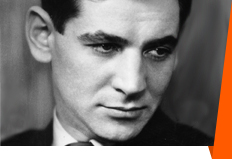
NOTES ON THE PIECES
- Leonard Bernstein
- Arias and Barcarolles
- Halil
- Concerto for Orchestra (Jubilee Games)
- Mass
- On the Town
- Prelude, Fugue and Riffs
- Serenade (After Plato’s Symposium)
- Symphony No. 1, “Jeremiah”
- Symphony No. 2, “The Age of Anxiety”
- Symphony No. 3, “Kaddish”
- West Side Story Suites
Symphony No. 3, “Kaddish”
Originally commissioned by the Boston Symphony Orchestra in 1955 but only completed in 1963, Bernstein’s Symphony No. 3, “Kaddish,” concerns itself, like his other two symphonies, with man’s loss of faith in a contemporary world, though it also expresses a hope for the ultimate survival and redemption of humankind. For Bernstein, whose father died a few years after the first version of the symphony was completed, the work was a profoundly personal statement. (The Kaddish, or is a Jewish liturgical prayer typically recited to mourn the dead.)
Excerpt from Bernstein’s Symphony No. 3, “Kaddish” (I. Invocation. Kaddish 1)
New York Philharmonic / Leonard Bernstein, Conductor; Felicia Montealegre, Narrator; Jennie Tourel, Mezzo-Soprano; Camerata Singers; Columbus Boychoir. Sony Classical SK 60595.
Find this and more of Leonard Bernstein’s work at ArkivMusic.com ›
Written for large orchestra, two choruses, and soprano soloist, the Symphony takes the form of a dialogue between man (represented by a Speaker) and God. In a text penned by Bernstein himself, the Speaker berates God for forsaking man and asks God to renew his faith in man. Although an accepted religious practice, for some listeners this was blasphemy; for others, it appeared that Bernstein was, yet again, “over the top.” Not surprisingly, the symphony had as many critics as admirers.
Over the years, Bernstein reworked the Speaker’s text, reducing it considerably, but it remains seldom performed, which is to be regretted: “Kaddish” contains some of his best and most imaginative writing, with many sections of exceptional beauty.
—Paul Myers
Paul Myers, a classical record producer for more than 40 years, is the author of several books, including a biography of Leonard Bernstein (Phaidon).
© 2001–2008 Carnegie Hall Corporation
- Home
- |
- Multimedia
- |
- Press
- |
- Partners
- |
- Supporters





